Knowde Enhanced TDS
Identification & Functionality
- Additives Included
- Chemical Family
- Polymer Name
- Plastics & Elastomers Functions
- Technologies
- Product Families
Features & Benefits
- Materials Features
- Product Attributes
- VESTAMID® L2124 NC is characterized by a high melt viscosity and good dimensional control during pipe extrusion.
- Properties of compounds based on PA12 vary little with changing humidity due to low moisture absorption. Parts made of this semi- crystalline material are characterized by exceptional impact strength, low coefficient of friction and good chemical resistance. Pigmentation may affect values.
Applications & Uses
- Applications
- Plastics & Elastomers End Uses
- Plastics & Elastomers Processing Methods
Properties
- Color
- Flame Rating
- Mechanical Properties
- Physical Properties
- Thermal Properties
- Electrical Properties
- Rheological Calculation Properties
- Test Specimen Production
- Rheological Properties
- Burn Testing Properties
| Value | Units | Test Method / Conditions | |
| Tensile Modulus (dry) | 58000 | psi | ISO 527 |
| Tensile Modulus (cond.) | 50800 | psi | ISO 527 |
| Tensile Strength (dry) | 3770 | psi | ISO 527 |
| Yield Stress (dry) | 3770 | psi | ISO 527 |
| Yield Stress (cond.) | 3190 | psi | ISO 527 |
| Yield Strain (dry) | 31 | % | ISO 527 |
| Yield Strain (cond.) | 27 | % | ISO 527 |
| Stress at 50% Strain (dry) | 3920 | psi | ISO 527 |
| Stress at Break (dry) | 5660 | psi | ISO 527 |
| Nominal Strain at Break (ɛtb, dry) | 200 | % | ISO 527 |
| Nominal Strain at Break (ɛtb, cond.) | min. 50 | % | ISO 527 |
| Tensile Creep Modulus (0.5% Strain, 1h, cond.) | 50800 | psi | ISO 899-1 |
| Tensile Creep Modulus (0.5% Strain, 1000h, cond.) | 39200 | psi | ISO 899-1 |
| Charpy Notched Impact Strength (+23°C, dry) | 66.6 | ftlb/in² | ISO 179/1eA |
| Charpy Notched Impact Strength (-30°C, dry) | 2.85 | ftlb/in² | ISO 179/1eA |
| Charpy Notched Impact Strength (-30°C, cond.) | 2.85 | ftlb/in² | ISO 179/1eA |
| Flexural Modulus (23°C, dry) | 58000 | psi | ISO 178 |
| Flexural Stress at Conv. Deflection (23°C, dry) | 2030 | psi | ISO 178 |
| Flexural Strength (23°C, dry) | 3050 | psi | ISO 178 |
| Flexural Strain at Flexural Strength (23°C, dry) | 9 | % | ISO 178 |
| Value | Units | Test Method / Conditions | |
| Density (dry) | 1.03 | g/cm³ | 1SO 1183 |
| Density (cond.) | 1.04 | g/cm³ | 1SO 1183 |
| Water Absorption (dry) | 1.3 | % | Sim. to 1SO 62 |
| Humidity Absorption (dry) | 0.5 | % | Sim. to 1SO 62 |
| Value | Units | Test Method / Conditions | |
| Melting Temperature (dry) | 336 | °F | ISO 11357-1/-3 |
| Temperature of Deflection Under Load A (1.80 Mpa, dry) | 113 | °F | ISO 75-1/-2 |
| Temperature of Deflection Under Load B (0.45 Mpa, dry) | 208 | °F | ISO 75-1/-2 |
| Vicat Softening Temperature A (10 N, 50 K/h, dry) | 327 | °F | ISO 306 |
| Vicat Softening Temperature B (50 N, 50 K/h, dry) | 257 | °F | ISO 306 |
| Coefficient of Linear Thermal Expansion (23°C to 55 °C, Parallel, dry) | 0.0001 | in/in/°F | ISO 11359-1/-2 |
| Coefficient of Linear Thermal Expansion (23°C to 55 °C, Normal, dry) | 9.44e-05 | in/in/°F | ISO 11359-1/-2 |
| Value | Units | Test Method / Conditions | |
| Volume Resistivity (pV, dry) | 1E10 | Ohm*m | IEC 62631-3-1 |
| Volume Resistivity (pV, cond.) | 2E9 | Ohm*m | IEC 62631-3-1 |
| Surface Resistivity (σE, cond.) | 1E12 | Ohm | IEC 62631-3-2 |
| Relative Permittivity (100Hz, dry) | 12 | — | IEC 62631-2-1 |
| Relative Permittivity (100Hz, cond.) | 16 | — | IEC 62631-2-1 |
| Relative Permittivity (1MHz, dry) | 3.8 | — | IEC 62631-2-1 |
| Relative Permittivity (1MHz, cond.) | 4.2 | — | IEC 62631-2-1 |
| Dissipation Factor (100Hz, dry) | 1600 | E-4 | IEC 62631-2-1 |
| Dissipation Factor (100Hz, cond.) | 1600 | E-4 | IEC 62631-2-1 |
| Dissipation Factor (1Mhz, dry) | 1500 | E-4 | IEC 62631-2-1 |
| Dissipation Factor (1Mhz, cond.) | 2000 | E-4 | IEC 62631-2-1 |
| Electric Strength (AC, S20/S20, t. 1 mm, dry.) | 813 | kV/in | IEC 60243-1 |
| Electric Strength (AC, S20/S20, t. 1 mm, cond.) | 686 | kV/in | IEC 60243-1 |
| Comparative Tracking Index (Test Solution A, 50 Drops Value, dry) | 600 | — | IEC 60112 |
| Comparative Tracking Index (Test Solution A, 50 Drops Value, cond.) | 600 | — | IEC 60112 |
| Value | Units | Test Method / Conditions | |
| Minimum Mold Temperature | 86 | °F | — |
| Maximum Mold Temperature | 212 | °F | — |
| Minimum Melt Temperature | 392 | °F | — |
| Maximum Melt Temperature | 464 | °F | — |
| Value | Units | Test Method / Conditions | |
| Injection Molding - Melt Temperature | 428 | °F | ISO 294 |
| Injection Molding - Mold Temperature | 140 | °F | ISO 294 |
| Injection Molding - Injection Velocity | 7.87 | in/s | ISO 294 |
| Injection Molding - Pressure at Hold | 10200 | psi | ISO 294 |
| Value | Units | Test Method / Conditions | |
| Melt Volume Flow Rate (dry, at 527°F, 11lb) | 18.8 | cm³/10min | ISO 1133 |
| Molding Shrinkage (Parallel, dry) | 0.7 | % | ISO 294-4, 2577 |
| Molding Shrinkage (Normal, dry) | 1.6 | % | ISO 294-4, 2577 |
| Mold Temperature (dry) | 176 | °F | — |
| Melt Temperature (dry) | 464 | °F | — |
| Value | Units | Test Method / Conditions | |
| Burning Behavior (at 1.5 mm Nominal Thickness) (dry) | HB | class | IEC 60695-11-10 |
| Burning Behavior (at Thickness 0.1260 in.) (dry) | HB | class | IEC 60695-11-10 |
Technical Details & Test Data
- Viscosity - Shear Rate HKR
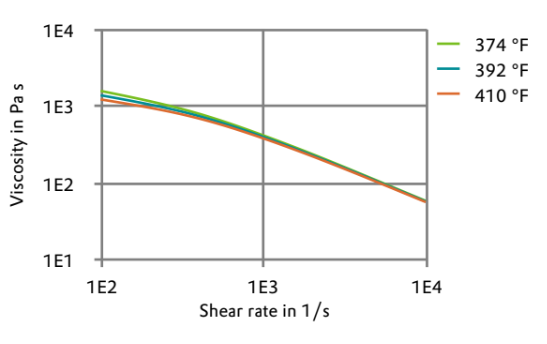
- Shearstress - Shear Rate HKR
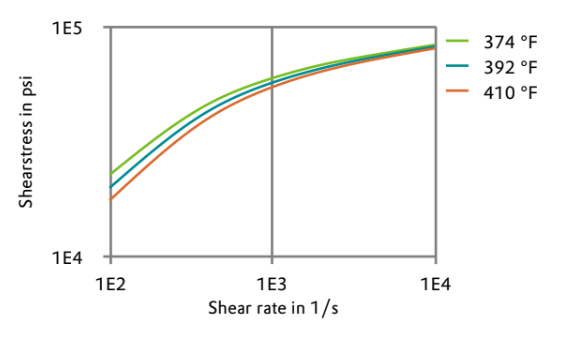
- Dynamic Shear Modulus - Temperature (Dry)
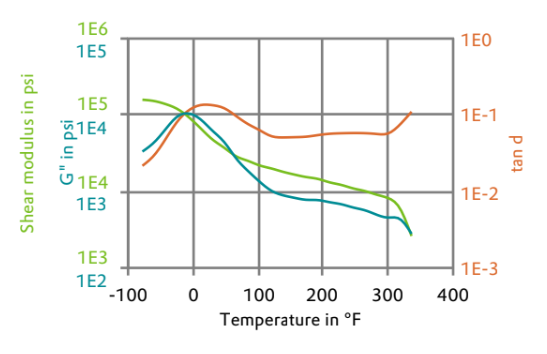
- Stress - Strain (Dry)
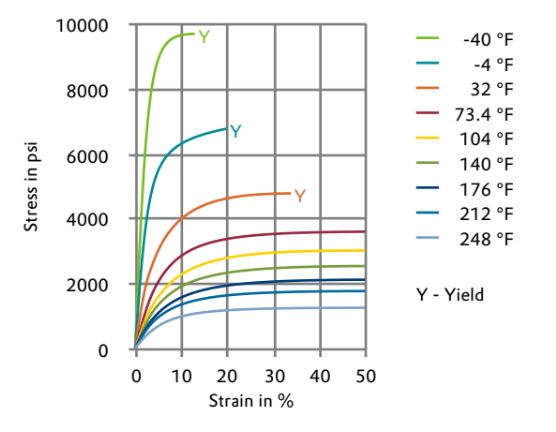
- Secant Modulus - Strain (Dry)
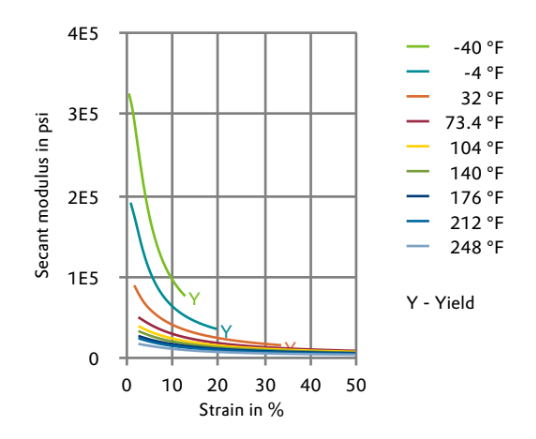
- Tensile Modulus - Temperature (Dry)
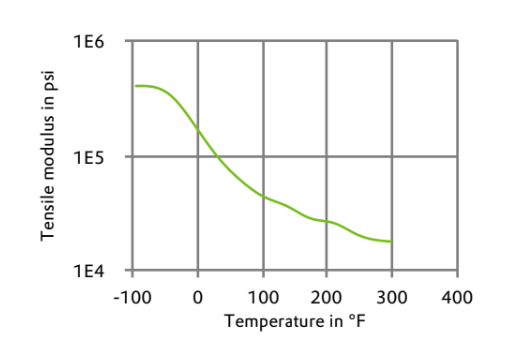
Storage & Handling
- Shelf Life
- 2 years
- Storage Conditions
Inside the original and undamaged packaging, the product has a shelf life of at least 2 years when stored in dry rooms at temperatures not exceeding 30°C.

